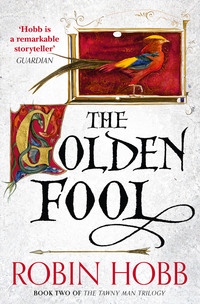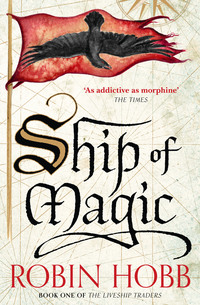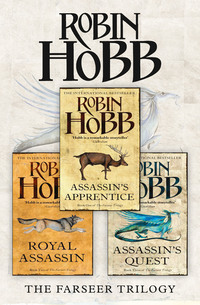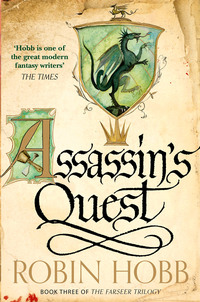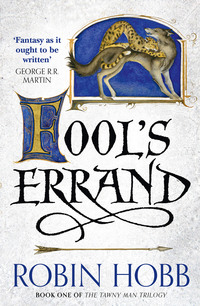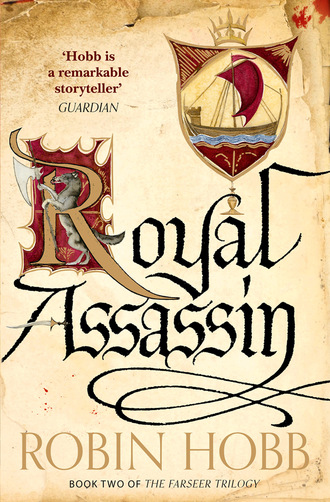
Полная версия
There had not been that many sentries. There was not much to this little town, scarce enough to deserve a dot on the map. The town had counted on the humbleness of its possessions to shelter it from raids such as this. Good wool they grew there, and they spun a fine yarn, it was true. They harvested and smoked the salmon that came right up their river, and the apples here were tiny but sweet, and they made a good wine. There was a fine clam beach to the west of town. These were the riches of Siltbay, and if they were not great, they were enough to make life treasured by those who lived here. Surely, though, they were not worth coming after with a torch and a blade. What sane man would think a keg of apple wine or a rack of smoked salmon worth a raider’s time?
But these were Red Ships, and they did not come to raid for wealth or treasures. They were not after prize breeding cattle or even women for wives or boys for galley slaves. The wool-fat sheep would be mutilated and slaughtered, the smoked salmon trampled underfoot, the warehouses of fleeces and wines torched. They would take hostages, yes, but only to Forge them. The Forge magic would leave them less than human, bereft of all emotions and any but the most basic thoughts. The Raiders would not keep these hostages, but would abandon them here, to work their debilitating anguish upon those who had loved them and called them kin. Stripped of every human sensitivity, Forged ones would scour their homeland as pitilessly as wolverines. This setting of our own kin to prey upon us as Forged ones was the Outislanders’ cruellest weapon. This I already knew as I watched. I had seen the aftermath of other raids.
I watched the tide of death rise to inundate the little town. The Outislander pirates leaped from the ship to the docks and flowed up into the village. They trickled silently up the streets in bands of twos and threes, as deadly as poison unfurling in wine. Some few paused to search the other vessels tied to the dock. Most of the boats were small open dories, but there were two larger fishing vessels and one trader. Their crews met swift death. Their frantic struggles were as pathetic as fowl flapping and squawking when a weasel gets into the chicken house. They called out to me with voices full of blood. The thick fog gulped their cries greedily. It made the death of a sailor no more than the keening of a sea bird. Afterwards, the boats were torched, carelessly, with no thought to their value as spoils. These raiders took no real booty. Perhaps a handful of coins if easily found, or a necklace from the body of one they had raped and killed, but little more than that.
I could do nothing except watch. I coughed heavily, then found a breath to speak. ‘If only I could understand them,’ I said to the Fool. ‘If only I knew what they wanted. There is no sense to these Red Ships. How can we fight those who war for a reason they will not divulge? But if I could understand them …’
The Fool pursed his pale lips and considered. ‘They partake of the madness of he who drives them. They can only be understood if you share that madness. I myself have no wish to understand them. Understanding them will not stop them.’
‘No.’ I did not want to watch the village. I had seen this nightmare too often. But only a heartless man could have turned away as if it were a poorly-staged puppet show. The least I could do for my people was to watch them die. It also was the most I could do for them. I was sick and a cripple, an old man far away. No more could be expected from me. So I watched.
I watched the little town awaken from soft sleep to the rough grip of a strange hand on the throat or breast, to a knife over a cradle, or the sudden cry of a child dragged from sleep. Lights began to flicker and glow throughout the village; some were candles kindled on hearing a neighbour’s outcry; others were torches or burning houses. Although the Red Ships had terrorized the Six Duchies for over a year, for these folk it became completely real tonight. They had thought they were prepared. They had heard the horror stories, and resolved never to let it happen to them. But still the houses burned and the screams rose to the night sky as if borne on the smoke.
‘Speak, Fool,’ I commanded hoarsely. ‘Remember forward for me. What do they say about Siltbay? A raid on Siltbay, in winter.’
He took a shuddering breath. ‘It is not easy, nor clear,’ he hesitated. ‘All wavers, all is change still. Too much is in flux, your majesty. The future spills out in all directions there.’
‘Speak any you can see,’ I commanded.
‘They made a song about this town,’ the Fool observed hollowly. He gripped my shoulder still; through my nightshirt, the clutch of his long, strong fingers was cold. A trembling passed between us and I felt how he laboured to continue standing beside me. ‘When it is sung in a tavern, with the refrain hammered out to the beat of ale mugs upon a table, none of this seems so bad. One can imagine the brave stand these folks made, going down fighting rather than surrendering. Not one, not one single person, was taken alive and Forged. Not one.’ The Fool paused. A hysterical note mingled with the levity he forced into his voice. ‘Of course, when you’re drinking and singing, you don’t see the blood. Or smell the burning flesh. Or hear the screams. But that’s understandable. Have you ever tried to find a rhyme for “dismembered child”? Someone once tried “remembered wild” but the verse still didn’t quite scan.’ There was no merriment in his banter. His bitter jests could shield neither him nor me. He fell silent once more, my prisoner doomed to share his painful knowledge with me.
I witnessed in silence. No verse would tell of a parent pushing a poison pellet into a child’s mouth to keep him from the Raiders. No one could sing of children crying out with the cramps of the swift, harsh poison, or the women who were raped as they lay dying. No rhyme nor melody could bear the weight of telling of archers whose truest arrows slew captured kinfolk before they could be dragged away. I peered into the interior of a burning house. Through the flames, I watched a ten-year-old boy bare his throat for the slash of his mother’s knife. He held the body of his baby sister, strangled already, for the Red Ships had come, and no loving brother would give her to either the Raiders or the voracious flames. I saw the mother’s eyes as she lifted her children’s bodies and carried them into the flames with her. Such things are better not remembered. But I was not spared the knowledge. It was my duty to know these things, and to recall them.
Not all died. Some fled into the surrounding fields and forests. I saw one young man take four children under the docks with him, to cling in the chill water to the barnacled pilings until the raiders left. Others tried to flee and were slain as they ran. I saw a woman in a nightgown slip from a house. Flames were already running up the side of the building. She carried one child in her arms and another clung to her skirts and followed her. Even in the darkness, the light from the fired huts awoke burnished highlights in her hair. She glanced about fearfully, but the long knife she carried in her free hand was up and at the ready. I caught a glimpse of a small mouth set grimly, eyes narrowed fiercely. Then, for an instant, I saw that proud profile limned against firelight. ‘Molly!’ I gasped. I reached a clawed hand to her. She lifted a door and shooed the children down into a root cellar behind the blazing home. She lowered the door silently over them all. Safe?
No. They came around the corner, two of them. One carried an axe. They were walking slowly, swaggering and laughing aloud. The soot that smeared their faces made their teeth and the whites of their eyes stand out. One was a woman. She was very beautiful, laughing as she strode. Fearless. Her hair was braided back with silver wire. The flames winked red in it. The Raiders advanced to the door of the root cellar, and the one swung his axe in a great arcing blow. The axe bit deep into the wood. I heard the terrified cry of a child. ‘Molly!’ I shrieked. I scrabbled from my bed, but had no strength to stand. I crawled toward her.
The door gave way, and the Raiders laughed. One died laughing as Molly came leaping through the shattered remnants of the door to put her long knife into his throat. But the beautiful woman with the shining silver in her hair had a sword. And as Molly struggled to pull her knife clear of the dying man, that sword was falling, falling, falling.
At that instant, something gave way in the burning house with a sharp crack. The structure swayed and then fell in a shower of sparks and an upburst of roaring flames. A curtain of fire soared up between me and the root cellar. I could see nothing through that inferno. Had it fallen across the door of the root cellar and the Raiders attacking it? I could not see. I lunged forth, reaching out for Molly.
But in an instant, all was gone. There was no burning house, no pillaged town, no violated harbour, no Red Ships. Only myself, crouching by the hearth. I had thrust my hand into the fire and my fingers clutched a coal. The Fool cried out and seized my wrist to pull my hand from the fire. I shook him off, then looked at my blistered fingers dully.
‘My king,’ the Fool said woefully. He knelt beside me, carefully moved the tureen of soup by my knee. He moistened a napkin in the wine he had poured for my meal, and folded it over my fingers. I let him. I could not feel the burned skin for the great wound inside me. His worried eyes stared into mine. I could scarcely see him. He seemed an insubstantial thing, with the faltering flames of the fireplace showing in his colourless eyes. A shadow like all the other shadows that came to torment me.
My burned fingers throbbed suddenly. I clutched them in my other hand. What had I been doing, what had I been thinking? The Skill had come on me like a fit, and then departed, leaving me as drained as an empty glass. Weariness flowed in to fill me, and pain rode it like a horse. I struggled to retain what I had seen. ‘What woman was that? Is she important?’
‘Ah.’ The Fool seemed even wearier, but struggled to gather himself. ‘A woman at Siltbay?’ He paused as if racking his brains. ‘No. I have nothing. It is all a muddle, my king. So hard to know.’
‘Molly has no children,’ I told him. ‘It could not have been her.’
‘Molly?’
‘Her name is Molly?’ I demanded. My head throbbed. Anger suddenly possessed me. ‘Why do you torment me like this?’
‘My lord, I know of no Molly. Come. Come back to your bed, and I will bring you some food.’
He helped me to my feet and I tolerated his touch. I found my voice. I floated, the focus of my eyes coming and going. One moment I could feel his hand on my arm, the next it seemed as if I dreamed the room and the men who spoke there. I managed to speak. ‘I have to know if that was Molly. I have to know if she is dying. Fool, I have to know.’
The Fool sighed heavily. ‘It is not a thing I can command my king. You know that. Like your visions, mine rule me, not the reverse. I cannot pluck a thread from the tapestry, but must look where my eyes are pointed. The future, my king, is like a current in a channel. I cannot tell you where one drop of water goes, but I can tell you where the flow is strongest.’
‘A woman at Siltbay,’ I insisted. Part of me pitied my poor Fool, but another part insisted. ‘I would not have seen her so clearly if she were not important. Try. Who was she?’
‘She is significant?’
‘Yes. I am sure of it. Oh, yes.’
The Fool sat cross-legged on the floor. He put his long fingers to his temples and pressed as if trying to open a door. ‘I know not. I don’t understand … All is a muddle, all is a crossroads. The tracks are trampled, the scents gone awry …’ He looked up at me. Somehow I had stood, but he sat on the floor at my feet, looking up at me. His pale eyes goggled in his eggshell face. He swayed from the strain, smiled foolishly. He considered his rat sceptre, went nose to nose with it. ‘Did you know any such Molly, Ratsy? No? I didn’t think you would. Perhaps he should ask someone more in a position to know. The worms, perhaps.’ A silly giggling seized him. Useless creature. Silly riddling soothsayer. Well, he could not help what he was. I left him and walked slowly back to my bed. I sat on the edge of it.
I found I was shaking as if with an ague. A seizure, I told myself. I must calm myself or risk a seizure. Did I want the Fool to see me twitching and gasping? I didn’t care. Nothing mattered, except finding out if that was my Molly, and if so, had she perished? I had to know. I had to know if she had died, and if she had died, how she had died. Never had the knowing of something been so essential to me.
The Fool crouched on the rug like a pale toad. He wet his lips and smiled at me. Pain sometimes can wring such a smile from a man. ‘It’s a very glad song, the one they sing about Siltbay,’ he observed. ‘A triumphant song. The villagers won, you see. Didn’t win life for themselves, no, but clean death. Well, death anyway. Death, not Forging. At least that’s something. Something to make a song about and hold onto these days. That’s how it is in Six Duchies now. We kill our own so the raiders can’t, and then we make victory songs about it. Amazing what folk will take comfort in when there’s nothing else to hold onto.’
My vision softened. I knew suddenly that I dreamed. ‘I’m not even here,’ I said faintly. ‘This is a dream. I dream that I am King Shrewd.’
He held his pale hand up to the firelight, considered the bones limned so plainly in the thin flesh. ‘If you say so, my liege, it must be so. I too, then, dream you are King Shrewd. If I pinch you, perhaps, shall I awaken myself?’
I looked down at my hands. They were old and scarred. I closed them, watched veins and tendons bulge beneath the papery surface, felt the sandy resistance of my own swollen knuckles. I’m an old man now, I thought to myself. This is what it really feels like to be old. Not sick, where one might get better. Old. When each day can only be more difficult, each month is another burden to the body. Everything was slipping sideways. I had thought, briefly, that I was fifteen. From somewhere came the scent of scorching flesh and burning hair. No, rich beef stew. No, Jonqui’s healing incense. The mingling scents made me nauseous. I had lost track of who I was, of what was important. I scrabbled at the slippery logic, trying to surmount it. It was hopeless. ‘I don’t know,’ I whispered. ‘I don’t understand any of this.’
‘Ah,’ said the Fool. ‘As I told you. You can only understand a thing when you become it.’
‘Is this what it means to be King Shrewd then?’ I demanded. It shook me to my core. I had never seen him like this, racked by the pains of age but still relentlessly confronted by the pains of his subjects. ‘Is this what he must endure, day after day?’
‘I fear it is, my liege,’ the Fool replied gently. ‘Come. Let me help you back to your bed. Surely, tomorrow you will feel better.’
‘No. We both know I will not.’ I did not speak those terrible words. They came from King Shrewd’s lips, and I heard them, and knew that this was the debilitating truth King Shrewd bore every day. I was so terribly tired. Every part of me ached. I had not known that flesh could be so heavy, that the mere bending of a finger could demand a painful effort. I wanted to rest. To sleep again. Was it I, or Shrewd? I should let the Fool put me to bed, let my king have his rest. But the Fool kept holding that one key morsel of information just above my snapping jaws. He juggled away the one mote of knowledge I must possess to be whole.
‘Did she die there?’ I demanded.
He looked at me sadly. He stooped abruptly, picked up his rat sceptre again. A tiny pearl of a tear trickled down Ratsy’s cheek. He focused on it and his eyes went afar again, wandering across a tundra of pain. He spoke in a whisper. ‘A woman in Siltbay. A drop of water in the current of all the women of Siltbay. What might have befallen her? Did she die? Yes. No. Badly burned, but alive. Her arm severed at the shoulder. Cornered and raped while they killed her children, but left alive. Sort of.’ The Fool’s eyes became even emptier. It was as if he read aloud from a roster. His voice had no inflection. ‘Roasted alive with the children when the burning structure fell on them. Took poison as soon as her husband awoke her. Choked to death on smoke. And died of an infection in a sword wound only a few days later. Died of a sword thrust. Strangled on her own blood as she was raped. Cut her own throat after she had killed the children while Raiders were hacking her door down. Survived, and gave birth to a Raider’s child the next summer. Was found wandering days later, badly burned, but recalling nothing. Had her face burned and her hands hacked off, but lived a short …’
‘Stop!’ I commanded him. ‘Stop it! I beg you, stop.’
He paused and drew a breath. His eyes came back to me, focused on me. ‘Stop it?’ he sighed. He put his face into his hands, spoke through muffling fingers. ‘Stop it? So shrieked the women of Siltbay. But it is done already, my liege. We cannot stop what’s already happening. Once it’s come to pass, it’s too late.’ He lifted his face from his hands. He looked very weary.
‘Please,’ I begged him. ‘Cannot you tell me of the one woman I saw?’ I suddenly could not recall her name, only that she was very important to me.
He shook his head, and the small silver bells on his cap jingled wearily. ‘The only way to find out would be to go there.’ He looked up at me. ‘If you command it, I shall do so.’
‘Summon Verity,’ I told him instead. ‘I have instructions for him.’
‘Our soldiers cannot arrive in time to stop this raid,’ he reminded me. ‘Only to help to douse the fires and assist the folk there in picking from the ruins what is left to them.’
‘Then so they shall do,’ I said heavily.
‘First, let me help you return to your bed, my king. Before you take a chill. And let me bring you food.’
‘No, Fool,’ I told him sadly. ‘Shall I eat and be warm, while the bodies of children are cooling in the mud? Fetch me instead my robe and buskins. And then be off to find Verity.’
The Fool stood his ground boldly. ‘Do you think the discomfort you inflict on yourself will give even one child another breath, my liege? What happened at Siltbay is done. Why must you suffer?’
‘Why must I suffer?’ I found a smile for the Fool. ‘Surely that is the same question that every inhabitant of Siltbay asked tonight of the fog. I suffer, my Fool, because they did. Because I am king. But more, because I am a man, and I saw what happened there. Consider it, Fool. What if every man in the Six Duchies said to himself, “Well, the worst that can befall them has already happened. Why should I give up my meal and warm bed to concern myself with it?” Fool, by the blood that is in me, these are my folk. Do I suffer more tonight than any one of them did? What is the pain and trembling of one man compared to what happened at Siltbay? Why should I shelter myself, while my folk are slaughtered like cattle?’
‘But two words are all I need to say to Prince Verity.’ The Fool vexed me with more words. ‘“Raiders” and “Siltbay”, and he knows as much as any man needs to. Let me rest you in your bed, my lord, and then I shall race to him with those words.’
‘No.’ A fresh cloud of pain blossomed in the back of my skull. It tried to push the sense from my thoughts, but I held firm. I forced my body to walk to the chair beside the hearth. I managed to lower myself into it. ‘I spent my youth defining the borders of the Six Duchies to any who challenged them. Should my life be too valuable to risk now, when there is so little left of it, and all of that riddled with pain? No, Fool. Fetch my son to me at once. He shall Skill for me, since my own strength for it is at an end this night. Together, we shall consider what we see, and make our decisions as to what must be done. Now go. GO!’
The Fool’s feet pattered on the stone floor as he fled.
I was left alone with myself. Myselves. I put my hands to my temples. I felt a painful smile crease my face as I found myself. So, boy. There you are. My king slowly turned his attention to me. He was weary, but he reached his Skill towards me to touch my mind as softly as blowing spider web. I reached clumsily, attempting to complete the Skill bond and it all went awry. Our contact tattered, frayed apart like rotten cloth. And then he was gone.
I hunkered alone on the floor of my bedchamber in the Mountain Kingdom, uncomfortably close to the hearth fire. I was fifteen, and my nightclothes were soft and clean. The fire in the hearth had burned low. My blistered fingers throbbed angrily. The beginnings of a Skill headache pulsed in my temples.
I moved slowly, cautiously, as I rose. Like an old man? No. Like a young man whose health was still mending. I knew the difference now.
My soft, clean bed beckoned, like a soft clean tomorrow.
I refused them both. I took the chair by the hearth and stared into the flames, pondering.
When Burrich came at first light to bid me farewell, I was ready to ride with him.
TWO
The Homecoming
Buckkeep Hold overlooks the finest deep water harbour in the Six Duchies. To the north, the Buck River spills into the sea, and with its waters carries most of the goods exported from the interior Duchies of Tilth and Farrow. Steep black cliffs provide the seat for the castle which overlooks the river mouth, the harbour and the waters beyond. The town of Buckkeep clings precariously to those cliffs, well away from the great river’s flood plain, with a good portion of it built on docks and quays. The original stronghold was a log structure built by the inhabitants of the area as a defence against Outislander raids. It was seized in ancient time, by a Raider named Taker, who with the seizing of the fort became a resident. He replaced the timber structure with walls and towers of black stone quarried from the cliffs themselves, and in the process sank the foundations of Buckkeep deep into the stone. With each succeeding generation of the Farseer line, the walls are fortified and the towers built taller and stouter. Since Taker, the founder of the Farseer line, Buckkeep has never fallen to enemy hands.
Snow kissed my face, wind pushed the hair back from my forehead. I stirred from a dark dream to a darker one, to a winterscape in forest land. I was cold, save where the rising heat of my toiling horse warmed me. Beneath me, Sooty was plodding stolidly along through wind-banked snow. I thought I had been riding long. Hands, the stable-boy, was riding before me. He turned in his saddle and shouted something back to me.
Sooty stopped, not abruptly, but I was not expecting it, and I nearly slid from the saddle. I caught at her mane and steadied myself. Falling flakes veiled the forest around us. The spruce trees were heavy with accumulated snow, while the interspersed birches were bare black silhouettes in the clouded winter moonlight. There was no sign of a trail. The woods were thick around us. Hands had reined in his black gelding in front of us, and that was why Sooty halted. Behind me Burrich sat his roan mare with the practised ease of the lifelong horseman.
I was cold, and shaky with weakness. I looked round dully, wondering why we had stopped. The wind gusted sharply, snapping my damp cloak against Sooty’s flank. Hands pointed suddenly. ‘There!’ He looked back at me. ‘Surely you saw that?’
I leaned forward to peer through snow that fell like fluttering lace curtains. ‘I think so,’ I said, the wind and snow swallowing my words. For an instant I had glimpsed tiny lights, yellow and stationary, unlike the pale blue will o’the wisps that still occasionally plagued my vision.
‘Do you think it’s Buckkeep?’ Hands shouted through the rising wind.
‘It is,’ Burrich asserted quietly, his deep voice carrying effortlessly. ‘I know where we are now. This is where Prince Verity killed that big doe about six years ago. I remember because she leaped when the arrow went in, and tumbled down that gully. It took us the rest of the day to get down there and pack the meat out.’


